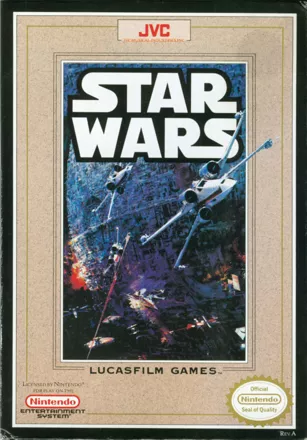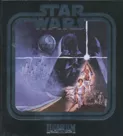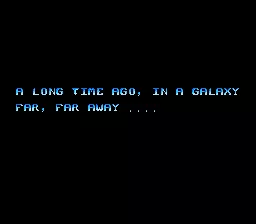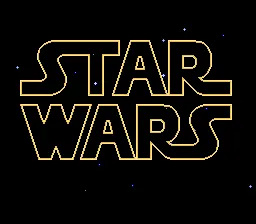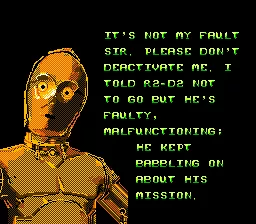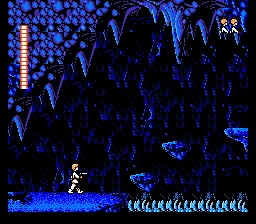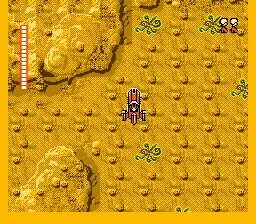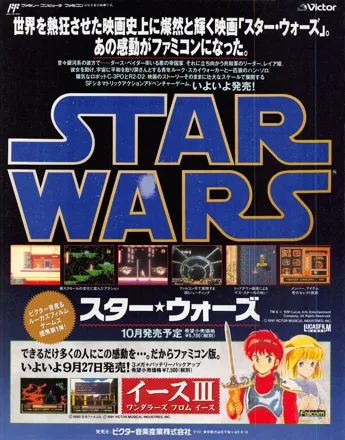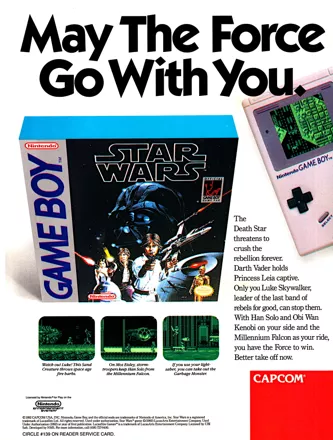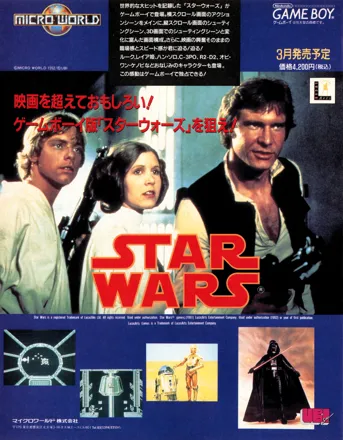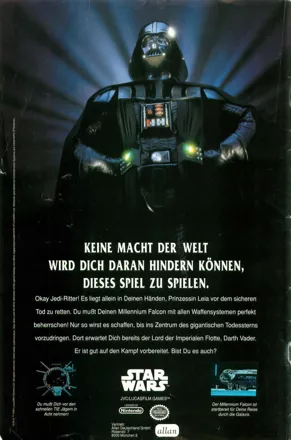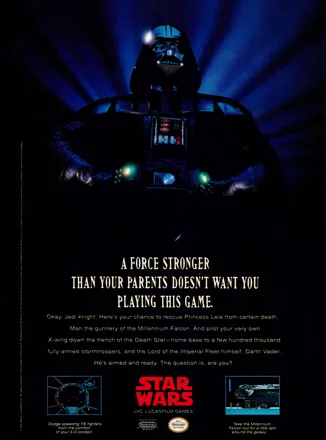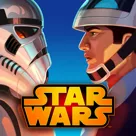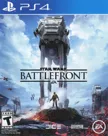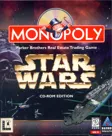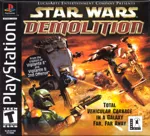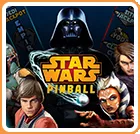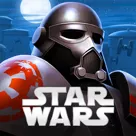Star Wars
-
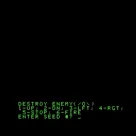 Star Wars
(1977 on
Ohio Scientific)
Star Wars
(1977 on
Ohio Scientific)
-
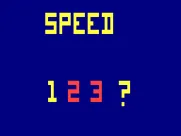 Star Wars
(1978 on
RCA Studio II)
Star Wars
(1978 on
RCA Studio II)
- Star Wars (1978 on Ohio Scientific)
-
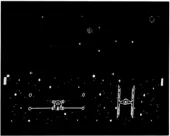 Star Wars
(1978 on
Intel 8080)
Star Wars
(1978 on
Intel 8080)
- Star Wars (1978 on Apple II)
- Star Wars (1978 on Mainframe)
-
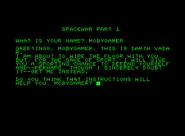 Star Wars
(1978 on
Mainframe, 1979 on
Commodore PET/CBM)
Star Wars
(1978 on
Mainframe, 1979 on
Commodore PET/CBM)
-
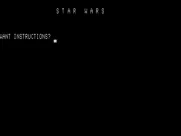 Star Wars
(1978 on
TRS-80)
Star Wars
(1978 on
TRS-80)
-
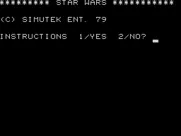 Star Wars
(1979 on
TRS-80)
Star Wars
(1979 on
TRS-80)
- Star Wars (1980 on Mainframe)
-
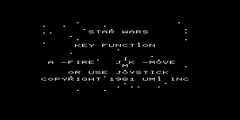 Star Wars
(1981 on
VIC-20)
Star Wars
(1981 on
VIC-20)
-
 Star Wars
(1983 on
Arcade, 1984 on
Atari 2600,
ColecoVision...)
Star Wars
(1983 on
Arcade, 1984 on
Atari 2600,
ColecoVision...)
-
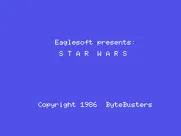 Star Wars
(1986 on
MSX)
Star Wars
(1986 on
MSX)
-
 Star Wars
(1987 on
NES)
Star Wars
(1987 on
NES)
-
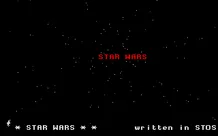 Star Wars
(1990 on
Atari ST)
Star Wars
(1990 on
Atari ST)
- Star Wars (1991 on Dedicated handheld)
Description official descriptions
This game is based closely on Star Wars Episode IV: A New Hope. It combines a number of gameplay styles, but primarily it is a side scrolling run-and-jump platformer.
The game begins on Tatooine, where you, as Luke Skywalker, must travel around and meet up with R2D2, C3PO, Obi-Wan, and so on. Eventually, you travel through Mos Eisley and the Death Star as well. While most of the game has you controlling Luke, Han or Leia directly, some of the various game styles include a first-person Millennium Falcon asteroid belt sequence, and an overhead view Death Star trench run.
Groups +
Screenshots
Promos
Videos
Add Trailer or Gameplay Video +1 point
See any errors or missing info for this game?
You can submit a correction, contribute trivia, add to a game group, add a related site or alternate title.
Credits (NES version)
53 People (52 developers, 1 thanks) · View all
| Original Game Design | |
| Contributions to Design | |
| Background Art | |
| Character Animation | |
| Producer | |
| Package Design and Art Direction | |
| Manual Design and Layout | |
| Documentation | |
| Proofreading | |
| Lucasfilm Games General Manager | |
| Product Marketing | |
| Lead Tester | |
| Lead Programming | |
| Flight Sequences Programmer | |
| Cinematic Sequences Programmer | |
| Additional Programming | |
| Character Animation | |
| [ full credits ] | |
Reviews
Critics
Average score: 71% (based on 37 ratings)
Players
Average score: 3.5 out of 5 (based on 63 ratings with 2 reviews)
A Long Time Ago...In A Nintendo Far, Far Away
The Good
Star Wars looks and sounds about as close to the 1977 film as a
8-bit Nintendo NES game could. The game's graphics, sound and music and storyline are well done and the standard platforming is broken up with some adventure quest elements and rides in some familiar vehicles and space ships.
The Bad
Star Wars is a frustratingly difficult game, which may cause many gamers to quickly lose interest.
Part of the problem is the game play mechanics, which seem a bit rough around the edges, especially for a game that often requires precious movements to avoid death. For example, the characters often slip and slide, which can making successfully jumping onto platform difficult.
While the adventure elements are a nice touch, having to map out an 8-bit desert terrain, for example, while also dodging enemies on your land speeder gets stale fast. Granted, it is likely hard, if not impossible, to make desert landscape particularly interesting within the hardware limitations of the old Nintendo.
However, the ability to explore worlds and the sequences that attempt to break up the standard platforming format with vehicles should be a lot of fun, especially to Star Wars fans. Yet, they are often more annoying them anything else.
Once you get inside the proper locations, you need to locate a familiar person or item, while also making tricky jumps and killing an assortment of Star Wars villains (i.e. Stormtroopers, Jawas and sand people).
While being able to switch between Luke, Han and Leia during game play is nice, all of the characters die remarkably easily and, unless Obi-Wan is located, their are no extra lives. Even then, the game has to be completed in one setting or else you get to start all over again.
Locating R2-DT and C3PO does not make them playable characters, but they can give you some advice or even access to a map. Chewbacca is, oddly enough, excluded from the game
Last, but not least, the game does not really have the traditional sort of bosses one might expect to see a platforming game.
Nice little Intermission sequences pop up when you locate a person or character or move onto the next level, but sometimes you may find yourself wanting bosses.
Heck, Darth Vader is basically reduced to mocking the player in game over sequences.
The Bottom Line
Star Wars looks and sounds about as close to the 1977 film as was possible for the Nintendo NES. Sometimes it may seem like, in comparison to the graphics and sound, not enough time was put into the game's control mechanics or smoothing out the action and adventure gaming elements.
NES · by ETJB (428) · 2012
A true classic hidden under its impossible difficulty
The Good
Star Wars is an action platformer made on a collaboration between Lucasfilm Games and the Australian developer Beam Software, for the Famicom/NES with a similar port to the Master System, and quite the faithful down-port for the Gameboy.
The different manuals of the versions are just pure nostalgia gold, all of them remark the fact that this is a single player game... but also how fun it is to "take turns" with two more friends, each one controlling just one of the characters :) Really? The Japanese FC manual promised that this game is the first part of an FC trilogy; we had the sequel The Empires Strikes Back, but sadly by the time they got to work on The Return of the Jedi the FC/NES days were basically over in favor of the Next Gen.
It combines three styles of gameplay. For the most part is a side scrolling action platformer, with three FPV shooter levels and one regular vertical shooter level. You control Luke, and your primary objective is to find the rest of the characters, and some shields for the Millennium Falcon. Obi Wan will give you a light-saber (and revive your secondary characters), R2-D2 will provide with a map of the Death Star, C-3PO will serve as an interpreter, and you can take control of Han, later Leia, both of them have better guns (but only one life) and she can also jump a bit further. The game has a non linear nature, with a completion percentage system, so you don't exactly need to find 100% every character, weapon or shield to finish the game, but of course, the more you get the easier it gets (though not by much).
The controls are very slippery, with a basic B shoots/run A jumps but they're quite responsive... which is good for all the relentless platforming and evading you need to do ahead. Here, the Game Boy port shine, because it's easier to control, the characters move slower giving you more time to react to stuff.
In his first job at Beam Software, game composer Marshal Parker made the musical arrangements on themes by - of course - John Williams, but there are also a couple of very nice original tunes
that are memorable and I think fit within the Star Wars universe.
The Bad
The game is extremely challenging overall; you need to master the controls and memorize each side scrolling section.
The platforming design is far from perfect, in many levels you are forced to take multiple leaps of faith, because you just can't see what's ahead or below; sometimes that's the way to go
and sometimes it just leads to an unfair death by falling or spikes.
But certainly the worst parts both in difficulty and design are not the platforming levels but all the flying stages, they're overly long, control very poorly and are way too hard. I'm tempted to think that the "3D" first person view Asteroid Field level and the flying Scape from the Death Star were actually made by a different team inside the Australian studio, because as impressive as they look, they also feel rudimentary and unpolished compared to the rest of the game. Brings back some nightmarish memories with the Back to the Future game (Beam Software first NES try) Probably the Asteroid Field level was the last most players got to see from the game back in the day: it's nearly impossible. To have a chance - just a minor chance - at beating the asteroids it's critical to find all the shields through the caves of the first map. About this, the Japanese FC version helped you a little bit, having a detailed map of Tatooine on the manual (with all the caves and places to go, and even what items you can get). The X-Wing vertical shooter attack on the trenches - the final stage - is also very bad and difficult because of how big and uncontrollable your ship is, and how fast the scrolling is. But this last stage certainly feels like the movie scene: absolutely epic.
Another painful aspect is that we have no save system and no passwords! It's not a long game, but the difficulty demands from the player to be extremely careful and patient; and the 3D FPV stages a lot of practice (and some luck).
The Bottom Line
For all its faults the game has heart, you can tell that the people that made this loved the movies. It's crawling with details: the alien band in the background of Mos Eisley cantina, Hans and Leia's theme,
The "box with legs" power droids, the running animation of the characters, the quirky jokes, the Millennium Falcon level sized background (astonishing!);
Its a hard game to put down, you want to see more of it, a little more... the difficulty then becomes just an extremely unfair challenge, and after painstakingly trying for hours upon hours anything can be overcome... and the joy of it when
you finally do it suddenly makes it all worth it: that's what truly makes a retro game classic.
NES · by pelida77 (36) · 2023
Analytics
Related Sites +
-
Video review of Star Wars games (WARNING: Language)
The Angry Video Game Nerd, James Rolfe, reviews various Stars Wars-based games, including Star Wars on NES.
Identifiers +
Contribute
Are you familiar with this game? Help document and preserve this entry in video game history! If your contribution is approved, you will earn points and be credited as a contributor.
Contributors to this Entry
Game added by quizzley7.
SEGA Master System added by ShadowAngel. Antstream added by lights out party. NES added by Terok Nor. Game Gear added by Big John WV.
Additional contributors: LepricahnsGold.
Game added July 23, 2002. Last modified February 2, 2025.


